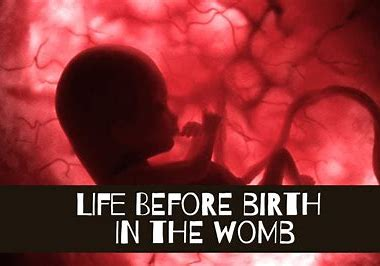
because it marks the beginning of the embryonic period.
Life Before Birth – In the Womb – YouTube
During this period, the baby’s major organs and body systems begin to form, including
the heart, brain, and lungs. Babies’ hearts actually start to beat as early as 18-24 days after
conception. By ten days after conception, a pregnancy test would be positive.
Conception is the joining of a sperm and egg, also known as fertilization. In most cases, conception occurs in a woman’s fallopian tube in the hours or days following sexual intercourse. However, in cases of assisted reproduction, particularly in vitro fertilization, conception can occur in a lab.
Conception marks the first step toward pregnancy—the sperm and egg have joined together, creating what is known as a zygote.1 In the coming days, the single-cell zygote transforms into a multi-celled embryo. But in order to facilitate pregnancy, the embryo must successfully move from the fallopian tubes and implant in the uterus, where it will continue to develop into a fetus and eventually an infant.
Illustration by Danie Drankwalter for Verywell Health Facts About Pregnancy
Conception In Pregnancy
Conception happens whenever a sperm and egg join together,
making a single-cell embryo that is called a zygote.1
This process may happen close to when a couple has sexual intercourse, but it can also occur days after intercourse. That’s because an egg can be fertilized in a 12- to 24-hour window, and sperm can survive in the female reproductive tract for up to 72 hours.2
If you have unprotected sex and ovulate three days later, you can become pregnant.
Conception Process
When you ovulate, you release an egg from the ovaries. This usually happens around
day 14 of the menstrual cycle, or about two weeks before your period is set to begin.2
Once an egg is released, it stays in the fallopian tubes—the part of the reproductive
tract that connects the ovaries to the uterus.
If sperm and an egg meet in the fallopian tube, conception is likely to occur.
Although hundreds of sperm might surround the egg, only one will break
through the egg’s outer layer to fertilize the egg. When that happens, the egg
undergoes a change to ensure that no other sperm can permeate or enter it.1
Zygote and Blastocyst
With conception, the egg and sperm join to make a single-cell embryo that is called a zygote. The zygote then divides to form a ball of cells called a blastocyst. A blastocyst is made up of an inner group of cells with an outer shell.1
Conception and IVF
In vitro fertilization (IVF) is a process to help people get pregnant when
they’re unable to conceive via intercourse. Reasons might include:
Infertility
The couple is same-sex
Someone wants to become a single parent
One or both people in the couple are transgender or gender nonconforming
With IVF, the conception process takes place in a lab. An egg—either from a parent-to-be or a donor—is mixed with sperm from the other parent or donor. In most cases, the sperm permeates the egg on its own after being mixed in a dish. However, in some cases, doctors will inject sperm directly into the egg.3
After IVF conception, embryos are either returned to the uterus
where they will hopefully implant or are frozen for future use.3
Implantation
After an egg is fertilized, it must implant in the lining of the uterus in order to lead to pregnancy. This is true of both traditional conception and IVF. Implantation generally occurs five to six days after conception, about a week before a missed period.
Once an embryo implants in the uterus, a woman’s body begins producing the hormone human chorionic gonadotropin, or hCG. This is also known as the pregnancy hormone, and it’s what pregnancy tests are designed to detect.
Detecting Pregnancy Hormones
HCG can be detected as early as 11 days after conception.
During a healthy pregnancy, hCG levels will rise very quickly in
the early stages of pregnancy, doubling every two to three days.
What Is Implantation Bleeding?
Does Conception Always Lead to Pregnancy?
Conception is just the first step toward pregnancy. With unassisted reproduction (intercourse), about 50% of fertilized eggs will successfully implant in the uterus and
cause the delay of a woman’s period, which is oftentimes the first sign of pregnancy.1
If an embryo is transferred during an IVF, implantation rates are tied to:
Age
Infertility causes
Health factors
Signs of Conception
Most people will not experience any signs or symptoms that indicate conception has occurred. Most of the early symptoms of pregnancy begin with the release of hCG,
which is detectable as early as 11 days after conception.
Early pregnancy symptoms can include:2
Breast changes, including breasts feeling fuller or more sensitive;
darkening of the areola (the area around the nipples)
Feeling of nausea
Feeling tired, moody, or bloated
Missing a period
Most pregnancy tests can detect pregnancy by the day that your
period was scheduled to start, about two weeks after conception.
Pregnancy Tests When Doing IVF
If you did IVF, it’s important not to test too soon, since the hormones used in IVF can mimic hCG and cause a false positive on a pregnancy test. Wait at least 10 days following an embryo transfer to take a pregnancy test.
Preparing for Conception
If you are trying to get pregnant, you should plan to have sex 72 hours before you ovulate, to 24 hours after you ovulate. This will give you the highest likelihood of sperm and egg meeting in the fallopian tubes.
Important developments in the brain and spine occur in the early days of pregnancy
before most women know they are pregnant. Because of that, women who are considering pregnancy should begin taking a prenatal vitamin that contains at least 400 micrograms of folic acid, which supports healthy spine and brain development.
A Word From Verywell
If you’ve decided to try to conceive, you’re likely feeling a mix of excitement and nervousness. Some people find trying to conceive thrilling while others find it stressful. Talk openly with your partner, if you have one, about how you are doing through the process of trying to conceive.
Remember that conception and successful pregnancy can take time.
If you’re older than 35, you should talk to a doctor if you’ve been trying to conceive unsuccessfully for six months; if you’re younger than 35, give yourself a year of trying before reaching out for assistance.
Learning to recognize the signs of ovulation, having sex in the fertile window, and making basic lifestyle changes—like healthy eating—can all boost your odds of conception and help you create the family you envision.
Could cancer become a chronic, treatable disease? For many, it already is. (msn.com)
Actual Abortion Procedure – Bing video

